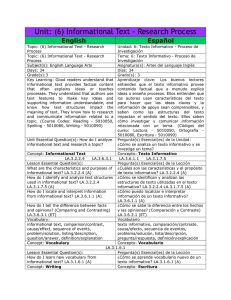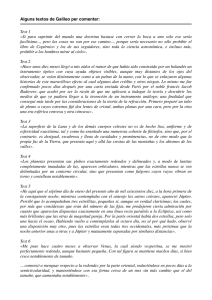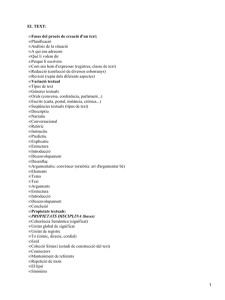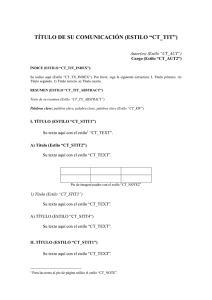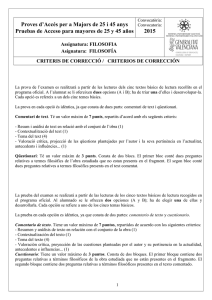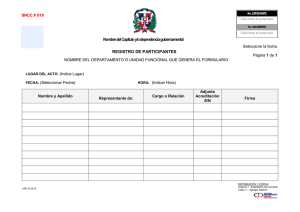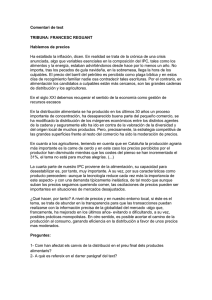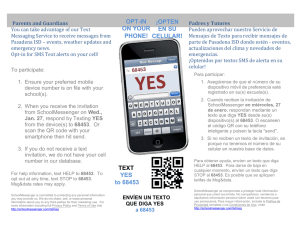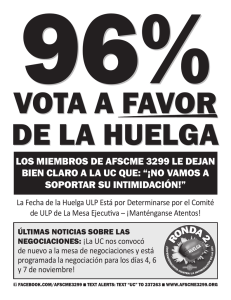Unit: (6) Informational Text - Research Process
Anuncio
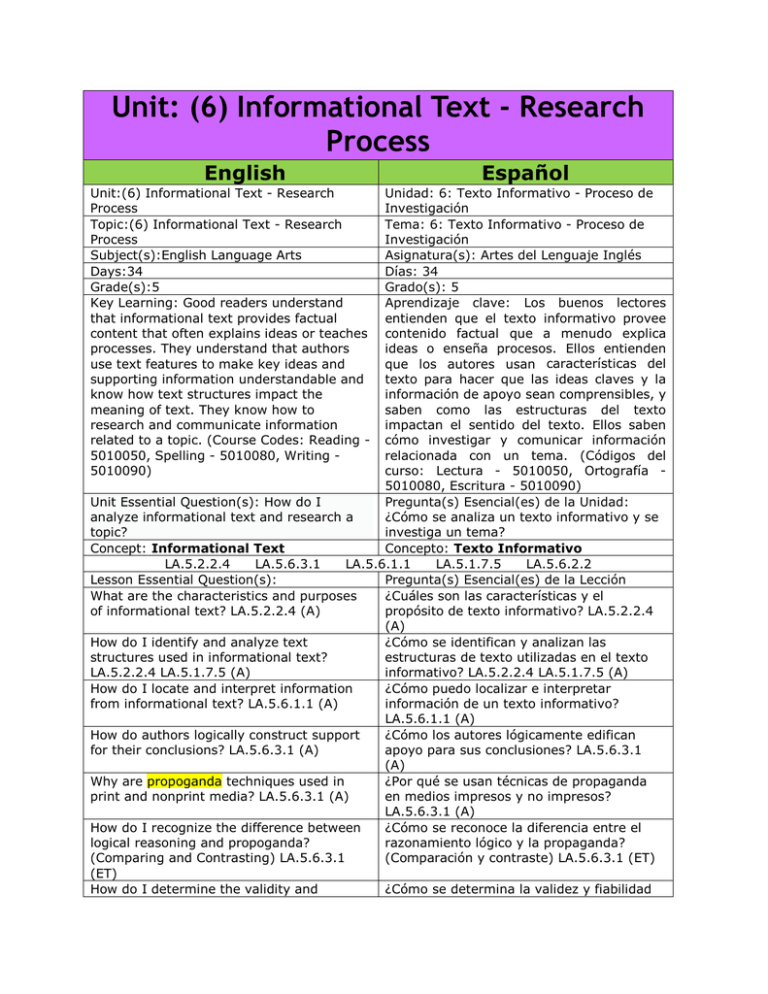
Unit: (6) Informational Text - Research Process English Unit:(6) Informational Text - Research Process Topic:(6) Informational Text - Research Process Subject(s):English Language Arts Days:34 Grade(s):5 Key Learning: Good readers understand that informational text provides factual content that often explains ideas or teaches processes. They understand that authors use text features to make key ideas and supporting information understandable and know how text structures impact the meaning of text. They know how to research and communicate information related to a topic. (Course Codes: Reading 5010050, Spelling - 5010080, Writing 5010090) Español Unidad: 6: Texto Informativo - Proceso de Investigación Tema: 6: Texto Informativo - Proceso de Investigación Asignatura(s): Artes del Lenguaje Inglés Días: 34 Grado(s): 5 Aprendizaje clave: Los buenos lectores entienden que el texto informativo provee contenido factual que a menudo explica ideas o enseña procesos. Ellos entienden que los autores usan características del texto para hacer que las ideas claves y la información de apoyo sean comprensibles, y saben como las estructuras del texto impactan el sentido del texto. Ellos saben cómo investigar y comunicar información relacionada con un tema. (Códigos del curso: Lectura - 5010050, Ortografía 5010080, Escritura - 5010090) Unit Essential Question(s): How do I Pregunta(s) Esencial(es) de la Unidad: analyze informational text and research a ¿Cómo se analiza un texto informativo y se topic? investiga un tema? Concept: Informational Text Concepto: Texto Informativo LA.5.2.2.4 LA.5.6.3.1 LA.5.6.1.1 LA.5.1.7.5 LA.5.6.2.2 Lesson Essential Question(s): Pregunta(s) Esencial(es) de la Lección What are the characteristics and purposes ¿Cuáles son las características y el of informational text? LA.5.2.2.4 (A) propósito de texto informativo? LA.5.2.2.4 (A) How do I identify and analyze text ¿Cómo se identifican y analizan las structures used in informational text? estructuras de texto utilizadas en el texto LA.5.2.2.4 LA.5.1.7.5 (A) informativo? LA.5.2.2.4 LA.5.1.7.5 (A) How do I locate and interpret information ¿Cómo puedo localizar e interpretar from informational text? LA.5.6.1.1 (A) información de un texto informativo? LA.5.6.1.1 (A) How do authors logically construct support ¿Cómo los autores lógicamente edifican for their conclusions? LA.5.6.3.1 (A) apoyo para sus conclusiones? LA.5.6.3.1 (A) Why are propoganda techniques used in ¿Por qué se usan técnicas de propaganda print and nonprint media? LA.5.6.3.1 (A) en medios impresos y no impresos? LA.5.6.3.1 (A) How do I recognize the difference between ¿Cómo se reconoce la diferencia entre el logical reasoning and propoganda? razonamiento lógico y la propaganda? (Comparing and Contrasting) LA.5.6.3.1 (Comparación y contraste) LA.5.6.3.1 (ET) (ET) How do I determine the validity and ¿Cómo se determina la validez y fiabilidad reliability of information that I read? de la información que se ha leído? LA.5.6.2.2 (A) LA.5.6.2.2 (A) Vocabulary: Vocabulario informational text, comparison/contrast, texto informativo, comparación/contraste, causa/efecto, secuencia de eventos, cause/effect, sequence of events, problem/solution, listing/description, problema/solución, lista/descripción, question/answer , definition/explanation, pregunta/respuesta, definición/explicación, validity, reliability validez, fiabilidad Concept: Vocabulary Concepto: Vocabulario LA.5.1.6.1 Lesson Essential Question(s): Pregunta(s) Esencial(es) de la Lección How do I learn new vocabulary from ¿Cómo se aprende vocabulario nuevo de un informational text? LA.5.1.6.1 (A) texto informativo? LA.5.1.6.1 (A) Concept: Writing Concepto: Escritura/Redacción LA.5.3.5.1 LA.5.3.5.3 LA.5.4.2.2 LA.5.4.2.5 Lesson Essential Question(s): Pregunta(s) Esencial(es) de la Lección How do I record information related to a ¿Cómo se registra la información topic? LA.5.4.2.2 (A) relacionada a un tema? LA.5.4.2.2 (A) How do I write in a format that is ¿Cómo se escribe en un formato que es appropriate for my audience and purpose? apropiado para la audiencia y el propósito? LA.5.3.5.1 LA.5.3.5.3 (A) LA.5.3.5.1 LA.5.3.5.3 (A) How do I write simple directions to a ¿Cómo se escriben direcciones sencillas a un lugar conocido usando los puntos familiar location using cardinal and ordinal cardinales y puntos de referencia? directions, landmarks, and distances? LA.5.4.2.5 (A) LA.5.4.2.5 (A) How do I create a map to match my written ¿Cómo se crea un mapa para que coincida directions? (Error Analysis) LA.5.4.2.5 (ET) con las direcciones escritas? (Análisis de error) LA.5.4.2.5 (ET) Vocabulary: Vocabulario format, cardinal directions, ordinal formato, direcciones cardinales, puntos de directions, landmarks referencia Concept: Research Concepto: Investigación LA.5.6.2.2 LA.5.6.2.1 LA.5.6.2.3 LA.5.6.2.4 LA.5.3.5.2 Lesson Essential Question(s): Pregunta(s) Esencial(es) de la Lección How do I choose a topic for research? ¿Cómo se escoge un tema de investigación? LA.5.6.2.1 (A) LA.5.6.2.1 (A) How do I write a research question? ¿Cómo se escribe una pregunta de LA.5.6.2.1 (A) investigación? LA.5.6.2.1 (A) How do I choose appropriate reference ¿Cómo se seleccionan materiales de materials? LA.5.6.2.1 (A) referencia adecuados? LA.5.6.2.1 (A) How do I evaluate the validity and reliability ¿Cómo se evalúa la validez y la fiabilidad de of information in my reference materials by la información en los materiales de examining several sources? LA.5.6.2.2 (A) referencia examinando varias fuentes? LA.5.6.2.2 (A) How do I choose relevant information to ¿Cómo se escoge información relevante include in my report? (Deductive para incluir en un informe? (Razonamiento Reasoning) LA.5.6.2.3 (ET) Deductivo) LA.5.6.2.3 (ET) How do I write a research report including ¿Cómo se escribe un informe de visual support? LA.5.3.5.2 LA.5.6.2.3 (A) investigación, incluido apoyo visual? LA.5.3.5.2 LA.5.6.2.3 (A) How do I cite resources for my report? ¿Cómo se citan los recursos de un informe? LA.5.6.2.4 (A) LA.5.6.2.4 (A) Vocabulary: cite Additional Information: Writing Goal: Research report using informational texts as resources. Resources should be cited. Vocabulario cita Información Adicional: Objetivo de Escritura: Informe de investigación usando textos informativos como recursos. Los recursos deben ser citados. Polk County Media Services link Enlace de los Servicios de Medios del Condado de Polk http://www.polk-fl.net/students/onlineresources/default.htm Fifth grade students are refining their Los estudiantes de quinto grado están research skills in preparation for middle perfeccionando sus destrezas de school. Having students identify sources investigación en preparación para la escuela including experts and various media sources intermedia. Es importante que los will be important. This unit provides an estudiantes identifiquen las posibles excellent opportunity for students to create fuentes, incluyendo expertos y fuentes de a PowerPoint presentation or a public diversos medios. Esta unidad provee una service announcement to present their excelente oportunidad para que los findings. estudiantes creen una presentación PowerPoint o un anuncio de servicio público para presentar sus resultados. Reading Comprehension Skill Sequence Secuencia de Comprensión de las Destrezas de Lectura March: Fact / Opinion Marzo: Hecho (Dato)/Opinión April: Review All Abril: Repaso de Todo May: Compare / Contrast, Preview for next Mayo: Comparación/Contraste, Avances del year Próximo Año Embedded throughout the year: Integrado todo el año: *Reference and Research * Referencia e Investigación *Vocabulary * Vocabulario *Summarizing * Resumir Suggested Resource: Harcourt Trophies Recursos Sugeridos: “Harcourt Trophies” (Trade books may be substituted for any of (los libros de intercambio pueden ser the stories listed below so students can be sustituido por cualquiera de las historias provided with time to select a research que se enumeran a continuación para que topic, conduct the research, prepare a los estudiantes puedan disponer de tiempo research report, and present the para seleccionar un tema de investigación, information.) realizar la investigación, preparar un informe de investigación, y presentar la información.) Week 29, March 14 -18, 2011 Spring Break Semana 29, 14 – 18 de marzo, 2011 Receso de Primavera Week 30, March 21 - 25, 2011, Distant Semana 30, 21 – 25 de marzo, 2011, Voyages: A Changing Planet - "Everglades" Distant Voyages: A Changing Planet by Jean George "Everglades" por Jean George Week 31, March 28 - April 1, 2011, Distant Semana 31, 28 de marzo - 1ro de abril, Voyages: A Changing Planet - "Summer of 2001, Distant Voyages: A Changing Planet Fire!" by Patricia Lauber "Summer of Fire!" por Patricia Lauber Week 32, April 4 - 8, 2011, Teacher Semana 32, 4-8 de abril, 2001, A discreción Discretion: Trade books relating to del maestro: Libros de intercambio Information and Research relacionados a Información e Investigación Week 33 &34, April 11 - 22, 2011, FCAT Semanas 33 & 34, 11-22 de abril, 2001, Reading, Math and Science Assessments Week 33 &34, April 11 - 22, 2011, Distant Voyages: A Changing Planet - "Oceans" by Seymour Simon Week 35, April 25 - 29, 2011, Distant Voyages: A Changing Planet - "Seeing Earth From Space" by Patricia Laube Week 36, May 2 - 6, 2011, Distant Voyages: American Adventure - "Black Frontiers" by Lillian Schlissel Resources: Distinguishing Details Fact or Opinion In My Own Words Main Idea Mania Research Round Up Super Summary Text Structure Reflection Text Structure Sort What's the Big Idea Word Map Outline Vocabulary Report • format - plan or method for organization of information • informational text - text centered on a subject matter or functional text encountered in the real world • cardinal directions - one of the four principal compass points: north, south, east and west • comparison/contrast - similarities and differences are presented between two or more topics or concepts • ordinal directions - any of the four intermediate compass points: eg. northeast, southeast, etc. • cite - acknowledge an author's words or ideas • cause/effect - ideas, events or facts are presented as cases in conjunction with the resulting outcomes or effects • sequence of events - events are described in numerical or chronological order • landmarks - a building or other place that is of historical or cultural importance • problem/solution - problem is presented followed by one or more solutions • listing/description - provides Pruebas del FCAT de Lectura, Matemáticas y Ciencias Semanas 33 & 34, 11-22 de abril, 2001, Distant Voyages: A Changing Planet "Oceans" por Seymour Simon Semana 35, 25-29 de abril, 2001, Distant Voyages: A Changing Planet - "Seeing Earth From Space" por Patricia Laube Semana 36, 2-6 de mayo, 2011, Distant Voyages: American Adventure - "Black Frontiers" por Lillian Schlissel Recursos Distinguiendo Detalles Hecho u Opinión En Mis Propias Palabras Idea Principal “Round Up” de Investigación Súper Resumen Reflexión de la Estructura del Texto Clasificación de la Estructura del Texto ¿Cuál es la gran idea? Bosquejo del Mapa de las Palabras Informe del Vocabulario • formato - plan o método para la organización de la información • texto informativo - texto centrado en un tema o texto funcional que se encuentra en situaciones del mundo real • puntos cardinales - uno de los de los cuatro puntos en una brújula: norte, sur, este y oeste • comparación y contraste semejanzas y diferencias que se presentan entre dos o más temas o conceptos • puntos ordinales - cualquiera de los cuatro puntos cardinales intermedios: por ejemplo. noreste, sureste, etc. • citar - reconocer las palabras o ideas de un autor • causa y efecto - ideas, acontecimientos o hechos se presentan como las causas en conjunto con los resultados o los efectos resultantes • secuencia de eventos – los eventos se describen en orden numérico o cronológico • monumento - edificio u otro lugar que es de importancia histórica o cultural • problema/solución – el problema se presenta seguido por una o más soluciones • • • • information about a topic question/answer - question is posed and then followed by answers definition/explanation - defining a complex term then further expanding with examples, explanations and restatements validity - accuracy of information (see FCAT item specs) reliability - dependability of resources (see FCAT item specs) • lista/descripción - provee información acerca de un tema • pregunta/respuesta – la pregunta se plantea, seguida de las respuestas • definición/explicación - definir un término complejo y luego ampliar aún más con ejemplos, explicaciones y actualizaciones • validez - exactitud de la información (véase FCAT “ítems specs”) • fiabilidad - la fiabilidad de los recursos (véase FCAT “ítems specs”))
